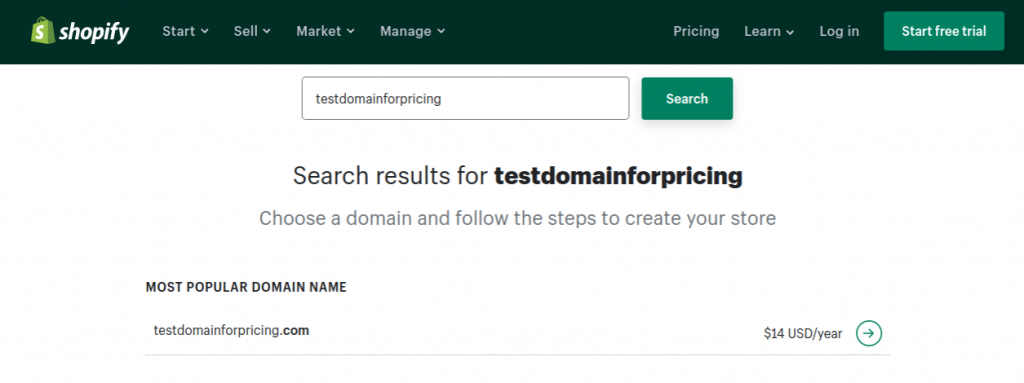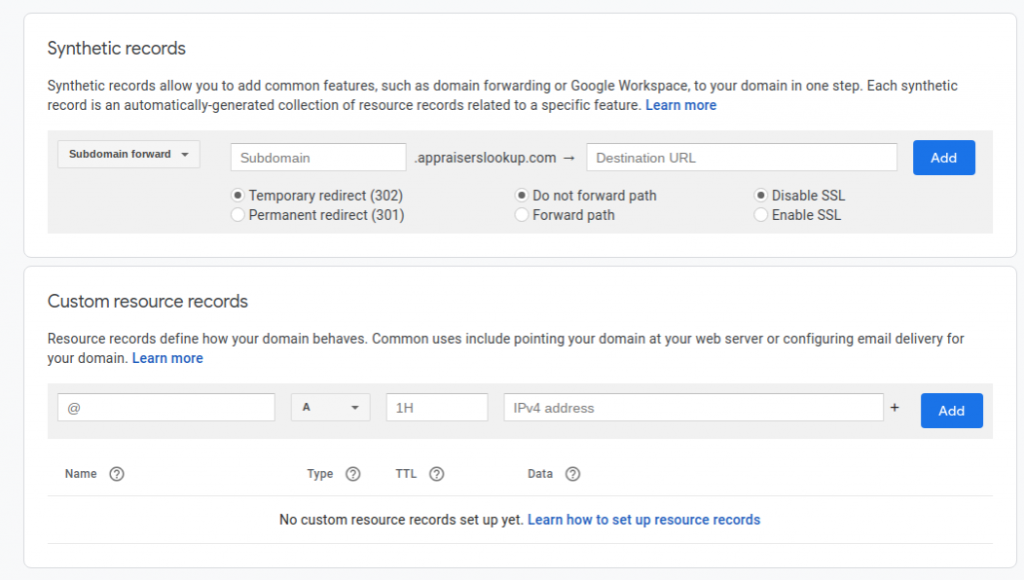One of the first steps you’ll want to take after signing up for a Shopify account is purchasing a domain name.
You can purchase a domain name directly from Shopify, but you’re probably aware that there are other 3rd party companies like Google Domains who offer domain purchases.
Should you purchase the domain from Shopify or not? The truth is that there is no single right or wrong answer, as it depends on the things you care about most. Keep reading to find out how to make this decision!
(In this article, we’ll compare Shopify domains to Google Domains since we use their services for domain registration. Any reputable 3rd party domain provider such as GoDaddy or Namecheap would likely provide a comparable experience).
If you care about cost, choose…Google Domains
Shopify domains has pricing of approximately $2 more per year. Below is an example for a random domain search on both platforms. You’ll see that Shopify domains is asking for $14 per year, while Google Domain only wants $12 per year.


Is $2 per year a lot? Well, for some, that would be considered a negligible difference. But if you’re just starting out and you’re really wanting to make sure your startup costs are within budget, every dollar counts and you may want to consider using a 3rd party domain provider for the cost savings.
If you care about flexibility, choose…Google Domains
One major advantage of a 3rd party domain provider such as Google Domains is that it is a neutral domain provider which will give you more flexibility in the future. What do we mean by that?
If you purchase a domain for your Shopify store through Shopify, you are committing the domain to your Shopify account. This means that to keep the domain alive, you’ll also have to pay the monthly Shopify account fee after the free trial expires. If you wanted to shut down your Shopify account and switch ecommerce platforms but keep your domain, you’ll need to go through a domain transfer process, which is a somewhat convoluted and time-consuming process.
With Google Domains, you can simply “point” your URL to the new ecommerce platform’s IP address and the switch will be far more seamless. If, after the free trial period for your Shopify, you decide to close down your Shopify account, your domain registration with Google Domains will remain in-tact and you’ll be free to continue to use the domain without having to pay again until the end of the first year.
If you don’t want to worry about technical configuration work, choose…Shopify domains
Admittedly, a very strong benefit of going with Shopify domains is that connecting your newly purchased domain to your Shopify store will be much quicker and straightforward. If you’re not very comfortable with technical configuration or would rather not worry about it, Shopify domains is likely your best bet.
3rd party domain configuration is by no means difficult, but you’ll have to be meticulous about following instructions and not making any mistakes. If you’re not confident and aren’t very detail oriented, Shopify domains might be a better choice for you.
Below is a screenshot of Google Domains’ configuration screen. You’ll need to get the IP address and other details for your Shopify store and enter them into the fields shown in your Google Domains account.

Shopify does provide some easy-to-follow instructions for connecting 3rd party domains, which can be found here. Perhaps a quick read of these instructions will provide you with a good sense of whether or not you’ll be comfortable with the domain configurations.
If you plan on selling your Shopify store or having someone else take over in the future, purchasing the domain from Shopify domains may be a nice way to simplify the transition and limit the hassles of any training or documentation.
If you don’t want all of your eggs in one basket, choose…Google Domains
As we mentioned, having Shopify take care of both your store’s backend as well as the domain’s configuration is certainly convenient. But if you care about having more control and diversifying risk, having your domain registration and store hosting with a single company might be concerning for some.
While unlikely, if there is a policy violation or legal issue with your store, Shopify may take action on both your storefront and domain name immediately. We of course would not condone any online activity that is illegal or violates Shopify’s policy, but there could very well be misunderstandings or errors that lead to such a situation.
If you split your storefront and domain between Shopify and Google Domains separately, any adverse action on the storefront would be less likely to affect the Google Domains registration. As a worst case scenario, you can maintain the same domain name and start again on a different hosting platform.
Which should you choose?
As you can see, the decision between Shopify domains and Google Domains or another 3rd party domain provider is completely up to you, and it should depend on what matters to you.
If you’re relatively new to websites and how they work, Shopify’s domain service is a very affordable way to get many of the details taken care of for you. On the other hand, if you’re comfortable with and are willing to take on the extra bit of work, going with a 3rd party domain provider can save you some money.
Finally, if you’re still undecided, perhaps you can think about the benefits of diversifying your risk by splitting your domain registration and ecommerce store hosting between two separate entities.